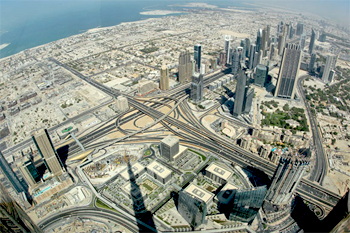Dubai, Oct 15: The UAE is well renowned for its limit-pushing feats, and during a sneak preview of Burj Khalifa’s newest attraction on Tuesday, it’s clear even the sky isn’t the limit here.
 Ascending a knee-wobbling 555 metres above ground, ‘At The Top Burj Khalifa Sky’ opens to the public today and is the world’s highest observation deck — outgrowing its closest competitor in China by a staggering 67 metres.
Ascending a knee-wobbling 555 metres above ground, ‘At The Top Burj Khalifa Sky’ opens to the public today and is the world’s highest observation deck — outgrowing its closest competitor in China by a staggering 67 metres.
Spread across two levels on floors 124 and 148, the new observation decks offer unmatched views of the ever-expanding city, with many calling level 148 the ‘hero’ as it’s now noted as the highest viewing point on earth in a building.
At Tuesday’s unveiling, the world’s tallest building added its seventh string to its record-holding bow and Country Manager for Guinness World Records Talal Omar told Khaleej Times the UAE is setting the benchmark when it comes to record making.
“Burj Khalifa was officially opened in 2010 and since then we’ve seen six records successfully attempted by it in terms of building records. But that has inspired other people to attempt records and since then we’ve seen the highest base jump from Burj Khalifa, as well as the highest building climb from it. I can’t wait to see what’s next.”
Rising 24 floors above the original ‘At The Top’, ‘Sky’ is set to see visitor numbers soar over the next few years and Emaar Properties executive director Ahmad Al Falasi is confident it will see a big increase on last year’s 1.8 million footfall.
“I urge all who live here and visit here to enjoy your bit of the sky,” he said at Tuesday’s preview.
Up, up and away
So what can we expect to see? With a stopover level on 125 hosting 360-degree indoor views, visitors will also get a new video perspective of the city with ‘Dubai — A Falcon’s Eye View’. But for those of you with a stomach to handle another 23 floors up, you won’t be disappointed.
Housing a premium food and drink lounge with panoramic views, level 148 also offers a brand-new, hands-on interactive experience for visitors allowing them to discover iconic destinations in Dubai using a life-size screen and sensory motion technology.
But enjoying the view from a steep height may mean even steeper pricing for some with pre-booked tickets costing Dh400 while immediate entry tickets will set you back Dh500. And it’s a view that just isn’t tempting enough, said British tourist Christopher Read.
“I’ve just been to At the Top and paid Dh125 for the privilege. I think that’s a fair price, so to me Dh400 is a little much and I honestly can’t see the view being all that different.”
But from what he’s seen so far in Dubai, people will always pay for the best, he said.
“I get the attraction though. To say you’ve visited the highest viewing deck in the world is pretty cool so I don’t think they’ll struggle to sell tickets, especially here.”
So if the dizzying prices don’t faze you, why not climb to even dizzier heights and become part of history.





Comments
Add new comment